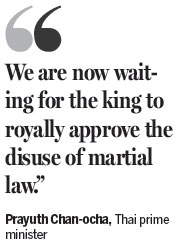Royal approval sought for ending martial law
Updated: 2015-04-01 07:49
By Agencies in Bangkok(China Daily)
|
|||||||||||
Thai Prime Minister Prayuth Chan-ocha said on Tuesday he has asked for King Bhumibol Adulyadej's permission to lift martial law, which has been in place since before a coup 10 months ago, replacing it with a law that maintains the army's wide-ranging powers.
Critics of the junta warned that the new law could prove more draconian and would allow Prayuth to exercise unrestricted power by citing a risk to national security.
Thailand's military seized power on May 22 last year, after months of sometimes violent street protests in Bangkok. It imposed martial law days before the coup.
Prayuth told reporters that once martial law is lifted it will be replaced with Article 44 of the interim constitution.
"We are now waiting for the king to royally approve the disuse of martial law," said Prayuth.
"We have prepared Article 44 and will use it soon."
He did not give a time frame for when the law would be lifted.
Prayuth has faced growing pressure to scrap martial law, which critics say is a deterrent to tourists and foreign investors.

Thai media have referred to Article 44 as "the dictator law". Under a similar law in the 1960s, a Thai dictator carried out summary executions.
The measure gives Prayuth power over all aspects of government, law and order, and absolves him of any legal responsibility for his actions.
The junta, known as the National Council for Peace and Order, has used strong-arm tactics to keep a lid on dissent.
Following the coup, it decreed that military tribunals would replace civilian courts to try some offenders.
Prayuth, who is also junta leader, said Article 44 contained six sections that address national security. It would allow the military to detain people for up to seven days without charge and apprehend groups and detain people without an arrest warrant.
Military tribunals will continue to be used for national security cases.
"Article 44 essentially means Prayuth is the law. He can order the detention of anyone without charge, without having to put the person on trial and for as long as he desires," Pravit Rojanaphruk, an outspoken columnist for The Nation newspaper, wrote on Tuesday.
Prayuth sought to downplay the concerns, telling reporters he would use Article 44 "constructively" to solve security issues.
AP - Reuters
(China Daily 04/01/2015 page11)
Today's Top News
Crash pilot had been treated for suicidal tendencies
Britain officially launches general election campaign
China's GDP growth likely to rise to 7.2% in Q2
Yili Group milks world of industry experience
Beijing solicits EU on joining AIIB
Crash co-pilot may have had detached retina
Warship arrives to evacuate Chinese nationals from Yemen
'Belt and road' blueprint boosts practical cooperation
Hot Topics
Lunar probe , China growth forecasts, Emission rules get tougher, China seen through 'colored lens', International board,
Editor's Picks

|

|

|

|

|

|





